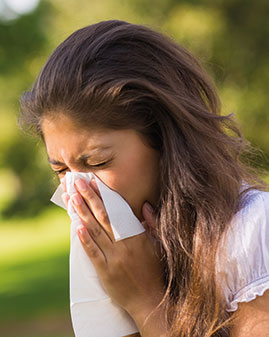Summer blues

Hay fever and other allergies can make your life a misery unless you get some help. Rude Health magazine finds out what natural options are available
What starts it?
“Allergic rhinitis most commonly takes the form of hay fever, a reaction to hatching dust mites or sensitivity to airborne allergens like pet hair,” according to Roz Crompton of Helios Homeopathy. “Symptoms make an appearance when an allergen such as pollen triggers a hypersensitive reaction in the eyes, nose, throat and/or chest. Contact with the allergen sets off the release of histamine that causes inflammation, streaming nose and congestion.”
“The human immune system is designed to respond to potential enemies, such as bacteria and viruses,” says Alison Cullen therapist and Education Manager at A.Vogel. “In some people, the immune system starts attacking benign substances such as plant pollen resulting in hay fever. The more stressed we are, the more likely our immune systems are to act in a hysterical manner when faced with something quite non-threatening.”
Homeopathy
According to Roz Crompton, “Homeopathy is a form of complementary healthcare that works with our natural healing process and has been successfully used for over 200 years. For example a person suffering from hay fever, might be given the remedy Allium Cepa (prepared from an onion), because a healthy person chopping an onion usually experiences watering eyes and irritation. However, the substances are given in minute doses prepared in a special way to avoid unwanted side-effects.” To get the best results from homeopathy always consult a qualified homeopath see www.irishhomeopathy.ie
Double up
“Use more than one remedy at a time,” says Max Wiseberg, Airborne Allergies Expert at HayMax. “People often find that one on its own doesn’t do the trick and so they stop using it and try something else. Often using two together is much better than just using one. Using saline washes to rinse out the nose can help, and Qu-Chi bands which work through acupressure have been found to be useful. Also consider taking something to help boost the immune system.”
Salt therapy
“The use of salt as a health remedy has been around since the Greeks, when Hippocrates recommended salt inhalation as a respiratory treatment,” says Brian O’Donoghue, a pharmacist from Virginia, Co Cavan who recommends the Salin Plus Air Purifier to his customers.
“During the 1800s, a Polish physician also discovered that men working in salt mines suffered fewer respiratory problems than the general population. Salt primarily works by activating cilia, tiny hair-like structures that line the lungs and sweep mucus and dirt out.”
Try using a salt pipe or a salt air purifier that disperses dry salt micro-particles into the atmosphere as you sleep, helping to open the airways, clear excess mucus and reduce inflammation. Filters need to be replaced every three to four months.
Natural help
- Avoid dairy products and cut down on refined sugar, both of which are mucus-forming and cause sinus blockages.
- Use a natural pollen barrier – a mixture of sunflower oil and beeswax when applied to the bottom of the nostrils, traps pollen, dust and pet allergens before they get in.
- Vitamin C is a natural antihistamine. Take a low dose (100mg-200mg) several times daily to get the most from it.
- Vitamin C is a natural antihistamine. Take a low dose (100mg-200mg) several times daily to get the most from it.
- Nettles have antihistamine action. Drink nettle tea or take a nettle tincture several times daily.
- Nasal sprays with dead sea salt and hyaluronic acid cleanse the nasal passages.
- Ask your local health store for a combination homeopathic remedy for typical hay fever symptoms.
If symptoms persist consult your healthcare practitioner.
Click here to read earlier Rude Health Magazine natural health articles.
Click here to read the latest issue of Rude Health Magazine.